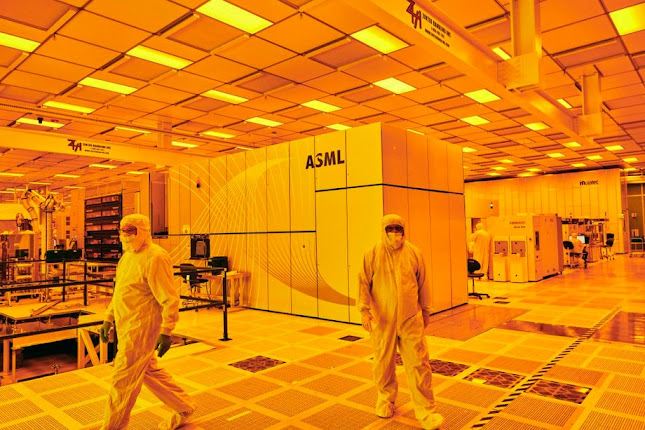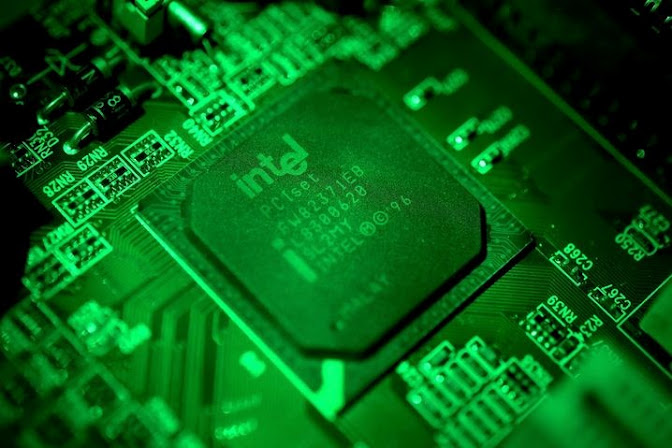Friends or Frenemies?
Significant Trans-Atlantic Divides Emerge in
Global Chip War
U.S. President Joe Biden has adopted a heavy-handed approach to China and hopes to cut Beijing off from modern chip technologies. To do so, he will need European support. Will he get it?
By Martin Hesse, Michael Sauga und Marcel Rosenbach
They cost up to $200 million each and weigh 180 tons. Delivering them requires loading individual parts into three jumbo jets.
Once assembled, they are as big as a bus and packed with a high-powered laser, precision lenses and electric robots.
Lithography machines can be used to manufacture semiconductors for smartphones, cars or even jet aircraft and the Dutch company ASML supplies this top European technology to chip factories all over the world.
But not to China.
If United States President Joe Biden gets his way, China won't be supplied with any of these wondrous systems in the future, either.
Years ago, the Dutch government, under pressure from the White House, decided it would deprive China of at least the latest generation of these machines.
Soon, Biden hopes, ASML will also hold back older models as well - a desire that is in line with a guiding principle of his administration, which views China as "the greatest risk to the international order."
The U.S. Is Making Business Difficult for Europe
Now, Biden is opening the next front in the economic war with Beijing – and this time, Europe is expected to join the fight.
In summer, U.S. Congress passed the CHIPS Act, a 50-billion-dollar piece of legislation aimed at strengthening the domestic semiconductor industry.
In October, Washington banned the export of advanced semiconductors to China – and extended the ban to all Western companies that make significant use of American technology.
Last week, the administration halted sales of communications and surveillance equipment from a number of Chinese companies.
The strategic goal is clear: Keep China's high-tech sector small, cut business ties and bring the chip industry back to the United States.
To achieve this goal, the Biden administration is also tightening the thumb screws on its allies in Europe: The industry, particularly in Germany, finds itself facing a decision as to whether it wants to be forced by Biden to withdraw from its digital China businesses.
And governments must also decide whether they need to further expand their own chip production.
And how should they react to the new export controls, which, according to an internal analysis by the European Commission, have "far-reaching consequences for global supply chains" and violate international law through their "extraterritorial effect?"
 Semiconductor research at IBM in Albany, New York. Foto: Bryan Derballa / The NewYorkTimes / Redux / laif
Semiconductor research at IBM in Albany, New York. Foto: Bryan Derballa / The NewYorkTimes / Redux / laifIs Europe standing firmly by the side of the United States?
Does it want to?
And does it have any other choice?
The issue is casting a shadow over the state visit of French President Emmanuel Macron to the U.S., a house call which was already weighed down by the Inflation Reduction Act, a protectionist measure.
Macron chided upon arrival that he merely wanted "to be respected as a good friend," a comment that set the tone for the visit.
The "chip war," as heralded in a bestselling book by American historian Chris Miller, is now in full swing.
For years, few politicians had any interest in the tiny components, commodities that are now part of practically every electronic consumer and investment product.
It was only experts who worried that the industry was becoming dangerously consolidated because of the gigantic development costs.
New, de facto monopolies have emerged, with enormous significance for central areas of the global digital economy.
The Dutch company ASML, for example, is the only company in the world whose processes can produce highly integrated circuits measuring only five nanometers.
One of its most important customers, Taiwan's TSMC, now produces around 90 percent of the ultramodern semiconductors needed by U.S. tech giants.
As such, the company is at the center of what is probably the greatest geo-economic risk scenario of the present day.
If a war were to break out over Taiwan, which Chinese leader Xi Jinping has not ruled out, the global economy could suddenly lose one of its most important raw materials.
The economic dangers of a chip crisis are "about 10 times greater than a failure of Russian gas supplies," says one Brussels-based industry expert.
It’s little wonder, then, that the U.S. had already made chip security a political priority under Donald Trump.
During his term, a growing number of high-tech products wound up on the U.S. Commerce Department’s "Entity List," which was initially aimed primarily at individual corporations such as the Chinese telecommunications multinational Huawei.
Boycotting an Entire Sector
Under Biden, Washington is now extending the boycott to the entire Chinese high-tech sector.
With its nearly 140-page export control catalog published in October, the U.S. government is moving not only to cut off China’s supply of recent generations of chips.
It is also seeking to prevent China from emerging as a competitor in quantum computing, artificial intelligence, biotechnology and renewable energies.
At the same time, Biden's security advisor Jake Sullivan wants to use the billions in subsidies from the U.S. CHIPS Act to ensure that large parts of the value chain are once again firmly rooted in U.S. soil: from raw materials to factories to recycling.
In the past, the U.S. only ever wanted to stay "a couple of generations ahead" of China, the technology strategist proclaimed in a keynote speech in September.
The task now, he said, is to "maintain as large of a lead as possible."
This marks a turning point that isn’t sparking enthusiasm everywhere, and certainly not within German industry.
Baden-Württemberg machine manufacturer Trumpf, for example, generates almost a fifth of its sales with ASML, for which it supplies the lasers for its most advanced machines.
The latest U.S. regulations won't directly affect that, because exports of high-end systems to China were already prohibited before.
Managers at Trumpf are nonetheless concerned about possible Chinese countermeasures in the wake of the U.S. boycott.
If China were to stop supplying connectors, cables or electronic components, it would "severely impact production," says company owner Nicola Leibinger-Kammüller.
In addition, China is a "large sales market" that can’t be eliminated "without serious consequences," she says.
"I don't even want to imagine what would happen in Germany if the Chinese market for automotive and mechanical engineering disappeared."
Many Companies Optimistic about Subsidies
Executives at pharmaceuticals company Merck take a similar view of the situation.
In addition to drugs and pharmaceuticals, the company supplies important materials and preliminary products for the semiconductor industry to China.
It is a business that the new U.S. rules could jeopardize, which prompted Merck CEO Belén Garijo to add her signature to a letter of warning published by a number of top German executives after the recent visit by Chancellor Olaf Scholz to China.
"Despite all the challenges," the letter states, the "fundamental growth momentum" will continue in China.
It then continued: "Withdrawing from China would cut us off from these opportunities," which is why it is "in Germany's very best interest" to continue cooperating with China.
Other companies, on the other hand, see potential upsides in the looming chip conflict.
They are counting on subsidies from the European Chips Act, with which the EU intends to counter the U.S. law of the same name and promote the construction of new chip factories – for companies like Infineon, for example, the German market leader.
In mid-November, company CEO Jochen Hanebeck surprised everyone by announcing plans to build a new plant in Dresden at a cost of 5 billion euros.
This could push forward "the green and digital transformation in Europe," Hanebeck said last month.
He said it would "strengthen Europe's resilience in times of growing semiconductor demand."
However, the industry argues that EU aid won’t be enough to bring Europe up to par with its competitors in Asia and the U.S.
"Investing only in production doesn't help much," says Reinhard Ploss, president of the German National Academy of Science and Engineering (Acatech) and Hanebeck's predecessor at Infineon.
To catch up, he says, Europe must promote the establishment of complete value chains – from research and development to manufacturing and software solutions – around semiconductors.
That's how the Americans do it.
They intend to pump $52 billion into the chip industry in America, much of it into research and development.
"More of that" needs to happen in Europe, says Hanebeck.
In addition, he says, the EU needs to be careful that its package "doesn’t become too bureaucratic."
The demand made by industry shows that the chip war has also developed into a subsidy race in which not only the U.S. and Europe, but also Asian countries like Japan and South Korea are taking part.
Governments in the West are now shelling out triple-digit billions to slow China’s rise.
And this to the delight of highly profitable corporations like Intel in the U.S., Samsung in South Korea and Rohm in Japan.
The chip giants can play the countries off against each other in the poker for stimulus money, factory land and favorable corporate taxes. And they can also hope to get rid of pesky competitors from up-and-coming China, as they managed to do with the electronics company Huawei.
 Chip manufacturers are looking forward to possible subsidies. Foto: SASCHA STEINBACH/EPA-EFE/Shutterstock
Chip manufacturers are looking forward to possible subsidies. Foto: SASCHA STEINBACH/EPA-EFE/ShutterstockThe company had been experiencing explosive growth, and in 2019, Huawei made an appearance in the top group of global mobile phone manufacturers, briefly even taking first place, ahead of Samsung and Apple.
But then, the U.S. government cut off its supply of semiconductors.
It is now a shadow of its former self.
Huawei is now no longer even in the top five, and in the first half of 2022 alone, revenues in the company’s mobile phone unit fell by 25 percent.
Company founder Ren Zhengfei and his top executives have since spoken of a fight for survival.
In an internal speech to executives in the summer, the founder prepared his people for tough times in the months ahead.
"Don’t assume that our future looks any brighter," he told them.
But the losers in the technology race also include Western consumers, who will have to brace themselves for rising prices.
China mainly manufactures components from earlier generations of technology.
If the country is completely cut off from the global market, then these chips are likely to become scarce and more expensive as a result.
Just as energy and raw materials are today, microchips could soon become a driver of inflation in Western economies.
It is still disputed whether the new U.S. strategy can actually increase the West's technological lead.
The Chinese are still far behind in semiconductors, says Antonia Hmaidi, a technology expert at the Berlin-based think tank MERICS.
She says that no Chinese company is capable of building chip fabrication machines at a level of quality close to ASML.
The best system manufactured in China currently creates chip sizes of 90 nanometers.
By comparison: Chips that are only five nanometers in size are installed in the iPhone 14.
And Taiwan's TSMC wants to start producing three-nanometer chips soon.
Harvard economist Dani Rodrik, meanwhile, is warning of a political miscalculation.
He says people are sympathetic when the U.S. uses economic means to defend itself against a specific military threat.
He has written that Biden is "aiming at nothing less that preventing China’s rise as a high-tech power."
Rodrik sees this as an "aggressive escalation" that could cause China to retaliate, raising tensions and further heightening mutual fears.
But few in the U.S. are listening to those voices.
Economic policy has become closely intertwined with security policy in Washington.
Criticism of Beijing is popular among voters and enjoys majority support among Democrats and Republicans alike, so China policy is one of the few areas in which Biden can count on compromises with the House of Representatives, where his opponents have held a majority since the mid-term Congressional elections.
Little Maneuvering Room for Europe
Europe's politicians have now grasped that.
In the era of a new great-power conflict, there is little room for regulatory considerations and the interests of the Europeans.
As such, their reactions fluctuate between cautious criticism, overzealous adaptation and attempts to minimize collateral damage.
The government of the Netherlands, which has been negotiating with the White House on ASML exports for years, is still quite clear.
"The Netherlands will not copy the American measures one-to-one," Commerce Minister Liesje Schreinemacher recently assured.
Washington cannot "simply impose such changes on her government," she said.
In Germany, the federal government, as usual, is divided.
During his visit to China last month, Chancellor Scholz sought to signal that Germany wants to continue to do business with Beijing to the extent possible, but Economy Minister Robert Habeck seems to be eager even to outdo the U.S.
This week, news emerged that Habeck wants to require German companies to submit regular reports on their activities in China.
Previously, he had moved to bar Chinese investors from acquiring the manufacturing division of the Dortmund-based Elmos, which provides semiconductors for the automotive industry.
It’s a decision that experts consider to be questionable.
"This was about a technology that Chinese companies have long since mastered themselves," says Jan-Peter Kleinhans, a chip expert at the Berlin-based think tank Stiftung Neue Verantwortung.
"Even under tighter U.S. export controls, this sale would have been unproblematic."
He argues that "erratic decisions" like that are "toxic for Germany as a place to do business."
In the cacophony of European capitals, even the European Commission in Brussels is finding it difficult to pursue a clear course.
On the one hand, the EU’s executive body is disappointed with Washington’s heavy-handed approach, in controlling chip exports and with the Inflation Reduction Act.
These decisions could "divide the West," French President Macron has scolded.
On the other hand, Brussels is also aware that Europe doesn’t need a major trade conflict with Washington right now.
The Europeans are dependent on the Americans for financial and military support for Ukraine, just as they are for the enforcement of sanctions against Russia.
"The edge has to be taken out of the conflict," says a source on the Commission.
The authority has resigned itself to the fact that there will be little left to change in the new U.S. laws, but it still hopes to negotiate one or two exceptions for European companies in the regulations.
The chip regulations, for example, will come under renewed scrutiny in Washington early next year.
At that point, the Europeans want to make clear that they will oppose any complete decoupling from the Chinese market.
If Brussels has its way, this will also apply to the ASML equipment that has been the subject of debate.
Sources at the Commission say that the export of the most state-of-the-art equipment will be stopped.
But it wants to ensure that older models can still be sold to China.

0 comments:
Publicar un comentario